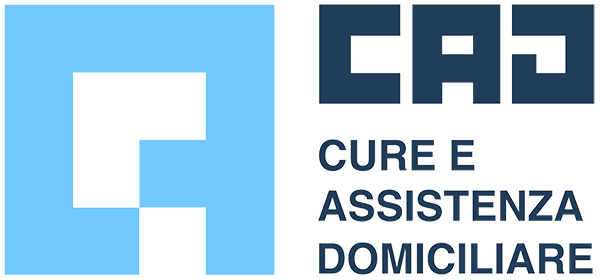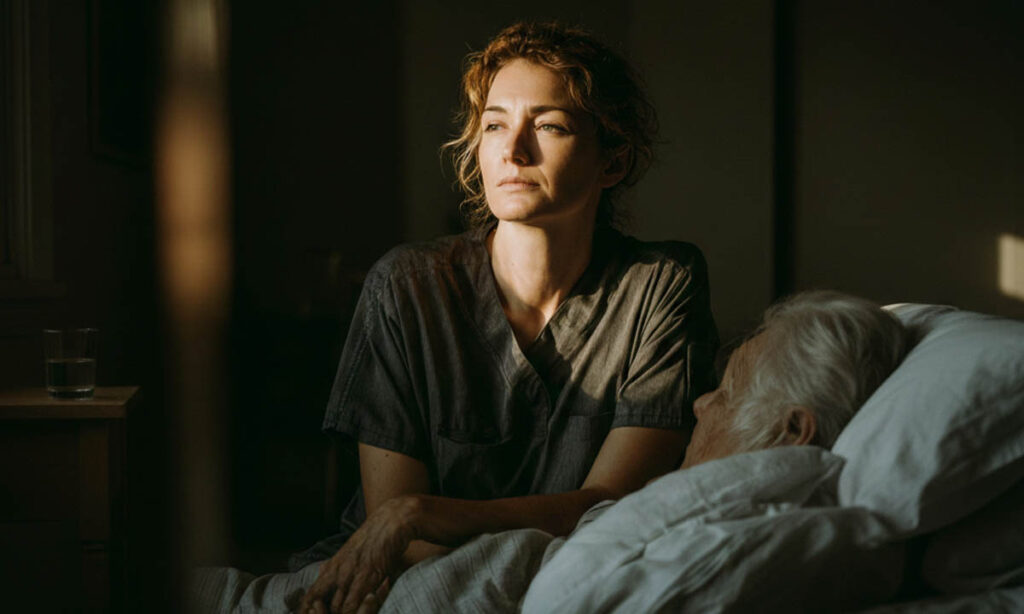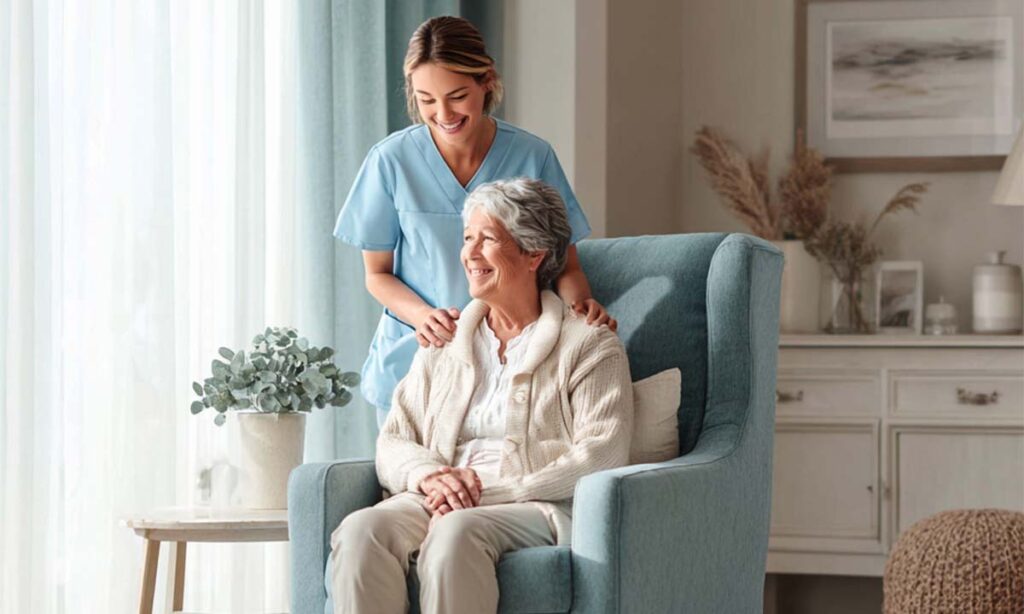The need for night assistance
The night can be a particularly critical time, causing great concern for elderly people or seriously ill patients receiving home care. To offer them greater peace of mind and security, it is essential to ensure adequate night-time assistance.
Risks increase at night, such as:
- falls in the dark;
- episodes of disorientation (especially for those suffering from cognitive decline);
- respiratory or painful crises that frighten those who are alone;
- isolation and fear for those who live alone.
Family caregivers, however present and dedicated they may be, need rest at night. However, many sleep anxiously and restlessly, always alert to hear if the elderly person gets up or needs help.
Adequate nighttime assistance is essential to ensure 24-hour continuity of care and safety. In Ticino, as elsewhere, the nighttime assistance service is organized on several levels:
- telephone availability (telecare)
- intervention on call
- permanent presence of staff in the home during the night, in the most serious cases.
Telecare and night-time teleassistance
Basic services available for night-time care for the elderly
The telecare service is available 24/7. During the night, if the elderly person presses the button or if a fall sensor is activated, the 144 emergency center responds immediately. This means that even in the middle of the night, there is an operator awake and ready to talk to the elderly person through the home’s speakerphone and send help. This service ensures that no one is left without help until morning in case of an emergency.
Technological innovations in preventive monitoring
However, remote assistance comes into play when something has already happened (the person has fallen or is already feeling unwell). The latest innovation aims to predict and prevent risks even during the night. For example, CAD uses sensors such as the bed monitoring system (Safe Bed Monitoring) and geolocation, which can detect if an elderly person with Alzheimer’s leaves the house disoriented at 3 a.m. In situations like this, the CAD operations center—which is also active at night—can intervene promptly, sending an operator before serious situations arise, such as a disappearance or an accident.
Telemonitoring services therefore make it possible to:
- prevent possible accidents
- intervene promptly
- guarantee continuous assistance even at night.
Scheduled night assistance service
For the most vulnerable people, the active presence of staff at night is necessary. In Ticino, some organizations also offer a nighttime home assistance service on request: for example, you can have a nurse or a social health worker who works the night shift at the patient’s home (often from 10 p.m. to 7 a.m.).
Typical clinical cases requiring continuous night care
Care during the night is recommended for unstable patients or those with continuous needs. Here are some examples:
- Patients with severe pain who require analgesics even at night
- Patients with ventilation/tracheostomy who may become obstructed and require night-time suction
- Elderly people with dementia and a risk of wandering (who tend to get up confused and risk hurting themselves).
However, not all areas of Ticino have a formally structured night care service. Some Spitex services stand out for having set up a team dedicated to night shifts.
In Ticino, private operators such as CAD – Cure e Assistenza a Domicilio (Home Care and Assistance) also offer assistance 24 hours a day, 365 days a year. This means that, if necessary, they can guarantee night-time intervention at short notice. Intervention can also be proactive: for example, CAD can schedule a night-time visit to a patient in a delicate condition to monitor vital signs or administer therapy.
Family vs. professional nighttime care
Limitations of “home” care within the family
Many elderly people live with their spouse or children who provide informal nighttime supervision. However, this form of care has its limitations because family members cannot replace a professional in complex situations. They may not know how to deal with a catheter that becomes blocked at 2 a.m. or how to intervene during an epileptic seizure.
Night nursing care: added value for caregivers too
Knowing that you can count on nursing availability is also essential for caregivers’ peace of mind. A family member who knows they can call a night nurse if something happens will (perhaps) sleep a little more peacefully.
In Ticino, home care services such as CAD guarantee just that: “24-hour on-call service, including holidays.”
This means that, for their patients, a nurse is always available by phone and, if necessary, will go directly to their home. Even on public holidays and at “inconvenient” times, such as 3 a.m. on Christmas Day. This is crucial to avoid trips to the emergency room for symptoms that can be managed at home. For example, a breathing crisis in a terminally ill patient can be treated with palliative medication by the home care team, without calling an ambulance, according to the agreed plan.
Assisting an elderly person at night: organizational and economic challenges
Difficulties in organizing night care for the elderly.
Organizing intensive night care is costly. Night staff face heavy shifts and must be adequately remunerated. Furthermore, not all families can afford to pay private individuals for night watch.
Therefore, the solution often adopted is to seek support from a live-in caregiver who sleeps in the home. If the elderly person only needs occasional help at night (e.g., to go to the bathroom), the caregiver can assist them by waking up when necessary. Many families in Ticino choose this solution.
However, if nighttime care requires continuous supervision—for example, when the patient is restless or needs constant attention—two caregivers working in shifts would be needed, which is difficult to organize. Furthermore, not all domestic workers have healthcare skills: if a patient needs to be monitored on an IV or a ventilator, the presence of a nurse is essential.
Comfort and sleep quality in the elderly and sick
Providing nighttime care does not mean disturbing the elderly person’s sleep unnecessarily. On the contrary, it means allowing them to sleep safely.
An innovative and empathetic approach to a peaceful night
Case of physiological incontinence. If an elderly person has nighttime incontinence, an innovative sensor system in the incontinence protection could alert the night caregiver that it is time to change it, preventing the elderly person from remaining wet for too long and waking up uncomfortable (or developing skin lesions).
Case of painkiller administration. The night caregiver could administer painkillers at set times to a cancer patient to prevent them from waking up in pain, adjusting the doses with the help of devices such as syringe infusion pumps.
An empathetic approach at night means entering the home on tiptoe: soft lighting, low voices, and respect for rest patterns. Often, just knowing that “someone is awake for me” helps the elderly person sleep better and avoid waking up during the night, because it dispels the anxiety of doubt: “What if something happens to me and I’m alone?”
Listening to needs and being sensitive to the emotions of the person being cared for helps to build a relationship of trust. It is rewarding to accompany physical support with the identification of emotional and psychological needs, as well as effective communication.
Complex patients and 24-hour monitoring
Continuous monitoring for people in critical situations as an alternative to hospitalization.
Consider a patient with a PEG (tube feeding), oxygen therapy, and a risk of suffocation, or a neurological patient with nighttime seizures. These “frail individuals” benefit greatly from professional nighttime supervision, without which they are often forced to be admitted to a nursing home (RSA).
Having home services that can handle needs even at night means being able to keep frail individuals in the comfort of their own homes. There are some good examples from certain Swiss cantons: individuals with ALS are cared for at home until the end of their suffering by night nurses in combination with daytime family caregiving, achieving an excellent quality of life.
Role of the on-call doctor and nighttime medical support
Generally, doctors do not make house calls at night, except in emergencies handled by 144. However, the family doctor can provide precise instructions to the nursing team on how to intervene in specific situations that may arise at night (intervention plans).
Pre-authorized protocols and remote medical support
A concrete example of a pre-approved intervention could be: “If during the night the patient reports severe pain, rated at more than 7 on a scale of 0 to 10, then an extra dose of 5 mg of morphine may be administered subcutaneously (SC), following the instructions in the medical protocol in use.”
These protocols, which are approved in advance, allow nurses to act independently. In Ticino, the law allows nurses to perform certain delegated tasks, and the “Strong Nursing Care” initiative aims to further strengthen their autonomy.
Already today, the nurse on call can contact the doctor on duty by telephone (via the 144 emergency number, which has doctors available for consultation) and act on the instructions received.
Testimonials and best practices
Christine Reichart, an APN nurse at Spitex Zürich, says that during night-time home visits she has found herself performing in-depth clinical assessments and objective examinations, collaborating remotely with telemedicine doctors, even in the evenings and at night.
The project has shown that it is possible to create an integrated team that can follow patients both digitally and in person, even outside office hours. Patients with reduced mobility or important family commitments “appreciated the sense of security offered by this solution and our presence,” says Dr. Katharina Müller, a doctor involved in the project.
This highlights that 24-hour care, when well organized, brings peace of mind to patients and caregivers.
Night care in Ticino: current situation and areas for improvement
In addition to CAD’s efforts, some private clinics also offer integrated 24-hour home care services for their discharged patients.
Currently, most night care in the region is provided by private non-nursing home care agencies. These agencies provide social and health care workers to perform night watches, the cost of which is generally borne by the family and calculated on an hourly basis.
This is a sensitive area where the quality of care can vary considerably. An important innovation would be to certify and train these operators as well, providing them with specific skills for night-time care: from the prevention of bedsores to the correct use of blankets to avoid hypothermia, to the management of lighting and other relevant aspects.
Conclusions: towards comprehensive night care for the elderly
Night care represents the frontier between comprehensive home care and care limited to office hours. We could say that “the day belongs to the nurse, the night to an invisible guardian angel.”
In Ticino, steps are being taken to ensure that even at night, elderly people who are not self-sufficient are not alone and frightened. The construction of a night-time protection network involves a mix of:
- Technology (alarms, cameras, telepresence)
- Human resources (caregivers, OSS, on-call nurses)
- Organization (availability coordinated with 144 and doctors)
Reassured, frail elderly people can sleep in their own beds, with their blankets and bedside lamps on if they prefer, surrounded by a vigilant network, even if it is invisible:
- A family member in the next room
- A sensor on their wrist
- An operator at the control center
- A nurse ready to respond if necessary
This approach guarantees not only safety but also respect: the elderly person is not woken up unnecessarily or transferred to a care facility unless it is really necessary. They can stay in their own home, assisted day and night. For those in critical condition, spending the night in their own environment, receiving adequate care, means living the time they have left with greater dignity and comfort.
Contact us to request our nighttime home care services.
Sources and further reading:
- Spitex Magazin. Mit nächtlicher medizinischer Fernüberwachung Eltern entlasten. 2024. Spitex Magazin
- Spitex Magazin. Vier Mitarbeitende berichten über die Freuden und Herausforderungen der nächtlichen Arbeit. 2024. Spitex Magazin
- Medinside. Wenn die Spitex zum 24-Stunden-Betrieb wird. 2017. medinside.ch
- Bundesamt für Gesundheit (BAG). Nächtliche Betreuung zu Hause – ambulante Angebote und Praxisbeispiele. Berna, 2019. Bag
- Moeckli N. SPOTnat: a national cross-sectional multicenter study of Swiss home-care clients. Tesi di dottorato, Università di Basilea, 2023. Edoc Unibas
- Steiger-Sackmann S., Wohlwend M., Simon M. How regulatory frameworks drive differences in Swiss home-care organisations. Health Policy & Management. 2023. Wiley Online Library
- ZHAW School of Health. Better data on the quality of home-care service (Spitex): project report 2024. ZHAW
- Ufficio federale di statistica & Spitex Schweiz. Spitex-Statistik 2023: spitex.ch




